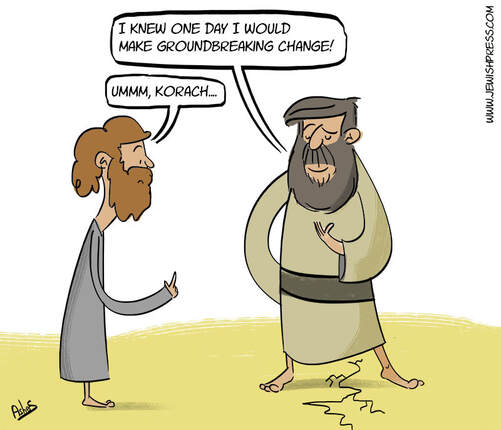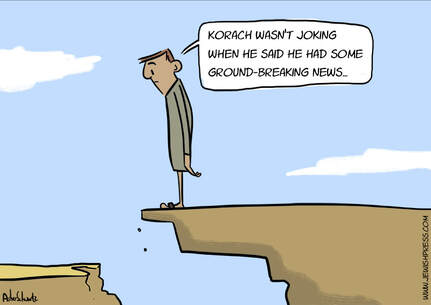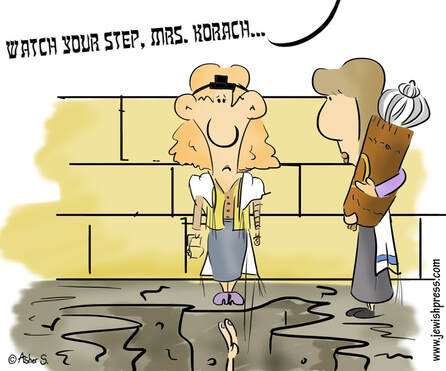
ויקמו לפני משׁה ואנשׁים מבני־ישׂראל חמשׁים ומאתים נשׂיאי עדה קראי מועד אנשׁי־שׁם׃
ויקהלו על־משׁה ועל־אהרן ויאמרו אלהם רב־לכם כי כל־העדה כלם קדשׁים ובתוכם יהוה ומדוע תתנשׂאו על־קהל יהוה׃
Now Korach the son of Yitz'har, the son of K'hat, the son of Levi, along with Datan and Aviram, the sons of Eli'av, and On, the son of Pelet, descendants of Re'uven, took men and rebelled against Moshe. Siding with them were 250 men of Isra'el, leaders of the community, key members of the council, men of reputation. They assembled themselves against Moshe and Aharon and said to them, "You take too much on yourselves! After all, the entire community is holy, every one of them, and Adonai is among them. So why do you lift yourselves up above Adonai's assembly?"
(Num 16:1-3 CJB)
KORACH YESTERDAY AND TODAY.
A while ago we learned how Aharon and Miriam’s challenge to Moshe’s authority did not end well. After that, we learned what happened to Israel because the leaders and spies challenged HaShem’s command through Moshe’s leadership to go and conquer the Land. After all that, it is amazing that Korach had the guts to go and challenge Moshe’s leadership. He must not have been listening. The fact that he met with such a fatal death, shows that he should have gotten the message through these other episodes of people challenging HaShem’s leadership though Moshe. Korach was fully responsible for his actions. Not only he did not listen, not only was he not sensitive to what HaShem was teaching Israel through all these previous events, but he influenced many other people to follow his bad example.
Somehow Korach makes me think of people today who read the Bible but though they read all the miracles HaShem does through Moshe; though they read how HaShem spoke to Moshe face-to-face; though they read that the people who challenged the authority that HaShem put in Moshe met with either leprosy or death, they still today challenge his authority and teachings.
Even Yeshua led people to Moshe’s teachings when He was asked about eternal life,
As he was starting on his way, a man ran up, kneeled down in front of him and asked, "Good rabbi, what should I do to obtain eternal life?" Yeshua said to him, … You know the mitzvot -- 'Don't murder, don't commit adultery, don't steal, don't give false testimony, don't defraud, honor your father and mother, . . .' " (Mar 10:17-19 CJB)
THE TENTH COMMANDMENT.
What was Korach’s sin? Hadn’t he heard the last two commandments?
"Do not give false evidence against your neighbor. ... "Do not covet your neighbor's house; do not covet your neighbor's wife, his male or female slave, his ox, his donkey or anything that belongs to your neighbor." (Exo 20:16-17 CJB)
If he did, why did he come to Moshe with the jealous accusation,
"You take too much on yourselves! After all, the entire community is holy, every one of them, and Adonai is among them. So why do you lift yourselves up above Adonai's assembly?" (Num 16:3 CJB)
Think of it. Korach accused HaShem’s chosen leader of the people. He accused he of whom HaShem said, ... Now this man Moshe was very humble, more so than anyone on earth. (Num 12:3 CJB) … of pride.
Not only that, but Korah’s accusation represented a false testimony to the 250 people he influenced against Moshe.
Korach challenged the notion that HaShem had communicated though Moshe that the priesthood only belonged to the sons of Aharon. Since Moshe was only a mouthpiece for HaShem, it is not Moshe that Korach challenged but HaShem Himself. Could the people today who challenge the teachings of HaShem through Moshe meet the same fate as Korach? This story should serve as an example to all the people today who say that the words Moshe spoke are obsolete. Paul uses these stories as exhortations for us today.
Now these things took place as prefigurative historical events, warning us not to set our hearts on evil things as they did. Don't be idolaters, as some of them were -- as the Tanakh puts it, "The people sat down to eat and drink, then got up to indulge in revelry." And let us not engage in sexual immorality, as some of them did, with the consequence that 23,000 died in a single day. And let us not put the Messiah to the test, as some of them did, and were destroyed by snakes. And don't grumble, as some of them did, and were destroyed by the Destroying Angel. These things happened to them as prefigurative historical events, and they were written down as a warning to us who are living in the acharit-hayamim. (1Co 10:6-11 CJB)
THE SIN OF KORACH: ENVY.
Korach was guilty of jealousy, envy, and covetousness. Here is a quote from the book of ethics, Pirkei Avot
הַקִּנְאָה וְהַתַּאֲוָה וְהַכָּבוֹד, מוֹצִיאִין אֶת הָאָדָם מִן הָעוֹלָם: Envy, lust [for food, drink, fornication, and the like] and honor [i.e., the desire to be honored by others] drive a man from the world.
In essence, envy is one of the things that destroy a person.
Envy keeps people so focused on what others have that they are oblivious to their own blessings. So not only envy doesn’t provide you with what you want, but like Korach who lost everything, envy takes away even that which you do have. It is absolutely counter-productive.
THE ANTIDOTE AGAINST ENVY.
There is only one way to get rid of envy, and that is to exercise thankfulness. As the apostle says,
In everything give thanks, for this is what God wants from you who are united with the Messiah Yeshua. (1Th 5:18 CJB)
The root of envy is a person’s quest for personal reward and satisfaction. Such a person can never be happy. Our sole goal should be to please HaShem and we please Him by being what He wants us to be. We may not all be roses, most of us may just be daisies, but let’s be the best little daisies we can be!
KORACH’S ACCUSATIONS.
I heard it said one time that people often accuse others of things they are themselves guilty of. They do that because what they see in others is their own evil inclinations and weaknesses. They therefore accuse others of things that they know they would do themselves.
It is very important to realise that. When we hear criticism of others, some people think that there must at least be some truth to it. Though it is a very important dynamic used in negative propaganda in political campaigns, it is a false premise, an erroneous conclusion. Some people do have the audacity to find fault in others within the things that these others actually excel. No example is more clear of that fact than Korach accusing he whom HaShem calls the humblest man on earth, of pride.
The person who was proud and envious of position was not Moshe but Korach who projected his own sinful vanitous embitions on Moshe. The sages of Israel often mention that when a person finds fault with others, he frequently is just mentioning his own fault, which he sees in others. We should therefore be careful about accepting accusations against others, especially against leaders. It is bad enough that this is how our political electoral campaigns are led, but it should not be the rule in the congregations of the Kingdom of God.
Rashi actually explains that the reason for Korach complaint of Moshe was not really against Moshe, but that it was a retaliation for being by-passed for a leadership position. When people criticise others, especially leaders, we should always look for their motivation.
THE REJECTED LEADERS.
The dynamics of HaShem’s chosen leader being rejected by the people he is to lead are an integral part of leadership in the Kingdom.
Joseph was rejected by his brothers. Moses was at first rejected by Israel and his leadership was sometimes challenged even by the members of his own family. Yeshua's leadership of israel also has also been challenged from the beginning, even by his own family. Even today, while people do not openly dare challenge His leadership, they still do so by twisting His words. They then create a form of religious observance that has nothing to do with what He originally intended.
Today, the Hebrew term “Like Korach and his followers” has become a term synonymous with rebellion.
Here is what Jude, one of the brothers of the Master had to say about complainers and those who challenge HaShem’s commandments like Korach did,
For certain individuals, the ones written about long ago as being meant for this condemnation, have wormed their way in -- ungodly people who pervert God's grace into a license for debauchery and disown our only Master and Lord, Yeshua the Messiah. Since you already know all this, my purpose is only to remind you that Adonai, who once delivered the people from Egypt, later destroyed those who did not trust. ... these people, with their visions, defile their own flesh, despise godly authority and insult angelic beings. ... these people insult anything they don't understand; and what they do understand naturally, without thinking, like animals -- by these things they are destroyed! Woe to them, in that they have walked the road of Kayin, they have given themselves over for money to the error of Bil`am, they have been destroyed in the rebellion of Korach. These men are filthy spots at your festive gatherings meant to foster love; they share your meals without a qualm, while caring only for themselves. They are waterless clouds carried along by the winds; trees without fruit even in autumn, and doubly dead because they have been uprooted; savage sea-waves heaving forth their shameful deeds like foam; wandering stars for whom the blackest darkness has been reserved forever. Moreover, Hanokh, in the seventh generation starting with Adam, also prophesied about these men, saying, "Look! Adonai came with his myriads of holy ones to execute judgment against everyone, that is, to convict all the godless for their godless deeds which they have done in such a godless way, and for all the harsh words these godless sinners have spoken against him." These people are grumblers and complainers, they follow their evil passions, their mouths speak grandiosities, and they flatter others to gain advantage. (Jud 1:4-16 CJB)
MAY WE LEARN FROM KORACH’ S EPISODE IN THE DESERT.
ר'גל
Rabbi Gaviel Lumbroso



 RSS Feed
RSS Feed